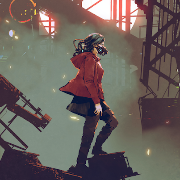|
Xelkelvos posted:Was it ever decided if a D&D book counted as a technical manual or not? I remember people thinking this being a thing that also got into Arivia's craw. It kind of is, in the sense that it is a manual to use the rules it offers. It's not actually designed to be read while on the shitter.
|
|
|
|

|
| # ? May 23, 2024 16:29 |
|
That Old Tree posted:Please go easy on Arivia. If she doesn't ragepost about Arthil fucked around with this message at 12:21 on Dec 23, 2018 |
|
|
|
Xelkelvos posted:Was it ever decided if a D&D book counted as a technical manual or not? I remember people thinking this being a thing that also got into Arivia's craw. This might actually be unknowable. But probably if its not a technical document it's art, and if it counts as art people are allowed (arguably, required) to criticise it as art and hooooooo boy nobody really wants that. Elector_Nerdlingen fucked around with this message at 12:45 on Dec 23, 2018 |
|
|
|
A not small portion of D&Dís audience does want to treat it as a book to be read for fun while taking a poo poo, and that 4e was not that is part of why it got folks so mad imo.
|
|
|
Xelkelvos posted:Was it ever decided if a D&D book counted as a technical manual or not? I remember people thinking this being a thing that also got into Arivia's craw. It's an interesting argument. I think where I've fallen is that an RPG manual is a guide to creating art, sometimes pop art, sometimes high art, mostly pop art. The manual is simply a methodology, and thus tends to be less art and more craftwork. That said, I think it's entirely possible for certain manuals to be art in and of themselves, something where personal emotional revelation can occur through the process of just reading the rules. The games that have manuals like this are the ones that are most often referred to "Not RPGs." Edit: Game rulebooks that are pop art used to be fairly common. Any game line that had significant metaplot had books that could be read for the pleasure of reading them alone. They also just tended not to be great. The Clanbooks from Vampire: the Requiem would be an example of something like that but done well.
|
|
|
|
|
Xelkelvos posted:Was it ever decided if a D&D book counted as a technical manual or not? I remember people thinking this being a thing that also got into Arivia's craw. The words "Guide," "Handbook," and "Manual" have been right in the titles since forever. They're as intended to be read as literature as much any IKEA pamphlet or cookbook. (Ie: Not at all.) It's an "everything looks like a nail because I only have a hammer" situation. Which is certainly adding frustration to the fire.
|
|
|
|
The Chaosium/Editions Sans-Detour situation grinds on. Chaosium have seen their way to putting out a unilateral licence which allows ESD to fulfil their crowdfunding obligations, but do nothing else with them. They also further outline how ESD haven't paid them for ages and shut down discussion whenever the subject turns to payment. Meanwhile, I'd link to ESD's side of the story but they don't seem to be offering one.
|
|
|
|
RPG gamebooks are not one thing or the other, they're their own genre with its own particular constructions. There's no reason to claim they're either purely like novels or purely like technical manuals. Consider the textual and instructional elements of an experimental theater production like Sleep No More. Those texts are not the final product of Sleep No More (the play) nor do they contain all variations on the events that will unfold (improvisation, audience reactions, etc). Gamebooks are similar, because they both attempt to provide instructions for how to play, yet also cannot encompass (nor try to encompass, if they're smart) everything that will play out in games they inform. And the game itself, as played, is not the same as a play or a short story, any more than a game of chess is like a play or short story, even as they involve very different elements than chess. Plus the writing and composition of RPG books is a fascinating study in a unique form, and is best understood neither as an atrophied novel nor a weirdly incomplete technical manual, in my opinion. The RPG is its own form of text, and an extremely flexible one, which in different examples has different sections shaped like short stories, like novels (metaplot), like technical manuals, and in some cases like writing prompts and creative writing exercises. And I just survived my first semester of graduate school in English Lit so clearly I'm an authority on this niche topic that doesn't really correspond to any of the literary forms I've learned about in a formal setting.
|
|
|
|
It's basically the old "are videogames art?" thing that Ebert famously waded into. For some reason breaking new ground is catnip to critics.
|
|
|
|
Joe Slowboat posted:RPG gamebooks are not one thing or the other, they're their own genre with its own particular constructions. There's no reason to claim they're either purely like novels or purely like technical manuals. No one is talking about gamebooks (which are CYOA books, like Fighting Fantasy/Lone Wolf). RPG rulebooks shouldn't be anything at all like novels because they are instruction manuals for how to play a game. The fact that they don't literally enumerate every possible thing you could do around a table (or that some games are badly designed and fail to provide rules for things that are expected to come up during play based on the themes those games are driving) does not change that. Lemon-Lime fucked around with this message at 15:15 on Dec 23, 2018 |
|
|
|
Plenty of game books contain setting fiction written as such, and some contain extensive worldbuilding and characters. Some even have metaphors which act out novel-like sequences. One can say that these are bad form and make the game worse, but they are absolutely present in some RPG books. That's been before we approach the question of what prose fiction in general is, and whether worldbuilding is more like prose fiction or even a novel than it is like a technical operation manual. I would contend a well-written RPG setting book uses many of the techniques and effects of literature, but also distinct techniques that are unique to the form. Setting material absolutely can be novel-like to good effect.
|
|
|
|
Joe Slowboat posted:Setting material absolutely can be novel-like to good effect. Yes, but the absence or presence of setting material has no bearing whatsoever on the fact that the primary purpose of a rulebook is to teach the rules to a game to that game's players. You can argue that the setting and rules sections of RPG books should be structured differently, because RPG books are several types of works glued together, which is fair. What you cannot do (and which a lot of the people who argue RPG books aren't technical manuals try to do) is claim that stapling a novella and a history book to the front of an IKEA instruction manual means you can no longer judge the IKEA instruction manual on how good it is at telling you how to assemble a table. Lemon-Lime fucked around with this message at 15:13 on Dec 23, 2018 |
|
|
|
Arivia posted:I have actually played Strike. I gave it a fair shake. Thatís why Iím so hard on it, because Iíve read it and played it and it was so disappointing. Lol what scjool did you get that engglish degree at dipshit a bad one apparently
|
|
|
|
I genuinely don't understand why it matters if an RPG book is a technical manual or not.
|
|
|
|
Reveilled posted:I genuinely don't understand why it matters if an RPG book is a technical manual or not. Because the purpose of an RPG manual is to teach the players how to play the game and provide a clear and easily usable index of rules to look up issues during play. Setting fluff pieces and art are very nice to get the look and feel of the game world across, but at the end of the day the book is most often a reference and guide to mechanics, and not paying attention to those use cases leads to rules being mixed into fluff and being unclear about what is meant to happen mechanically versus the in-world description of game effects. Technical writing is above all else concerned with clear and concise transmission of complicated technical information and processes, so has a lot to offer as far as producing clear, concise rules text that is easy for players to use. Liquid Communism fucked around with this message at 16:43 on Dec 23, 2018 |
|
|
|
Reveilled posted:I genuinely don't understand why it matters if an RPG book is a technical manual or not. On top of that RPGs also get judged by their mechanics in a variety of ways. An RPG can have good mechanics, but if the reference material isn't well done, it's still going to be difficult to play. As an example, I really like Blades in the Dark and I think the Load mechanic is impressive as hell, but it's very poorly explained in the relevant rules section. If an RPG book also has setting material - whether descriptive or narrative - then that can also be judged on a whole different set of standards. What's really important about all of these is that the techniques and content that best serve each goal is not only not the same, they're often diametrically opposed.
|
|
|
|
Comrade Gorbash posted:Because you judge them by different standards. A technical manual that's fun to read but where the instructions are unclear or difficult to follow isn't an effective one. There's also the balance between a good teaching manual and a good reference manual; most RPG books need to be both which can be a very difficult thing to achieve. To clarify, I don't really get why it has to have some label like "technical manual" to permit you to judge the rules based on their quality. Surely you can judge whether a book's rules are well written and concise without quibbling over whether "a D&D book counted as a technical manual or not".
|
|
|
|
The label is there as a handy tag for the metrics the rules sections should be judged by, that's all.
|
|
|
|
That new D&D third party book that's been making the rounds on RPG Twitter, Strongholds & Followers is a good example of balancing tone. It has the old school cheeky tone of having random asides and sometimes jokey footnotes and all but it never gets in the way of saying 'here's how you give your party a very nice castle to run and how to make it more fun than just a gold sink'. You should have both but if you're sacrificing clarity for tone you've hosed up making a rule book.
|
|
|
|
Also, Iíd definitely suggest that the fiction, art, layout etc a rule book includes absolutely serve a role in helping a group play the game as the designer desired, alongside the mechanical text. Art especially, but those elements help communicate what the intended end product of the mechanics looks like. In a medium as interpretation and judgement-call heavy as RPGs, a book which communicates what a successful implementation of its contents looks like is really helpful. Basically, you can get a lot further with evocative art/fluff/design elements and middling rules than you can with perfectly clear rules outlined in black and white in a google doc.
|
|
|
|
You'll sell a lot more copies, but the game may or may not be playable. See example of Shadowrun 5e, which has slick production and good art, but has no ability to determine where fluff text ends and rules start, and casually uses terms that should be rules keywords across both.
|
|
|
|
Flavivirus posted:Also, I’d definitely suggest that the fiction, art, layout etc a rule book includes absolutely serve a role in helping a group play the game as the designer desired, alongside the mechanical text. Yep. And also, having good art and a cool pitch really help sell a game, too. So it's good all around to have both good rules and good art.
|
|
|
|
Document review and analysis is never empirical and therefore however one approaches it, a certain measure of humility and deference to other opinions is warranted. That doesn't mean terrible products shouldn't be called terrible, but, it's better to not be a huge rear end in a top hat about it. As for categorization, probably RPG products are best understood and analyzed by comparison to other RPG products... but, as I have done before, it's useful to look to other genres and disciplines to find potential for innovation and improvement. As an example, tutorial and reference are totally different organizational types, and games would be well served by producing separate documents to accomplish each rather than trying to do both at once.
|
|
|
|
If RPG books were just technical manuals I would own zero instead of thousands. That sounds awful. I love reading rpg books, sometimes especially for games I don't play. A cool look at different aspects of a setting you can think about is way better than a bone dry how to play game.
|
|
|
|
Lord_Hambrose posted:If RPG books were just technical manuals I would own zero instead of thousands. That sounds awful. Also a well written technical manual isn't bone dry either.
|
|
|
|
Comrade Gorbash posted:The point isn't that they should 'just be technical manuals.' It's that they are technical manuals in addition to everything else. And that's the part they often are really bad at. Pretty much this. If I want to read a story, odds are I'm going with a novel, not opening up some edition's DMG. Even when I'm reading RPG content for fun, I'm generally not doing it for just the story unless I'm stealing the story to tack onto a different system. They have to be technically clear or else they fail, outright, at the most important thing that distinguishes them from other books.
|
|
|
|
RPGs are technical manuals, but they're not teaching the reader how to engage with a purely objective process. They're not teaching code or circuitry or mathematics, they're teaching how to create a narrative, of varying degrees of specificity. Just because a history book doesn't usually have large chunks of fiction in it doesn't mean that RPG manuals shouldn't, because seeing examples of narratives created (however loosely) is a useful guide for those reading the book. Tone and theme are hugely important when reading a RPG manual because then the participants of the game will be transferring that tone into the narratives they create. I would argue that due to the highly subjective nature of the product that the RPG manual is teaching, it has to inherently vary significantly from other forms of technical manuals. The closest examples would be genre writing guides, but even there is difference because of the cooperative nature of the RPG and the possibility of an increasing specificity for a RPG. Not all RPGs are emulating a broad genre or presenting a generic system, most of them are presenting a specific setting and providing details of how to write stories in that setting. So, a RPG manual might be closest to a series bible for a long running television show, which includes things on how certain characters behave and on minutae of the world so that writers who might not be familiar with the series are able to generate material for it. And then, of course, there are the occasional RPG manual designed to tell a very specific story, like Lady Blackbird, which would require different metrics to measure it on. So yes, RPGs are technical manuals, but that's only the beginning of the story.
|
|
|
|
|
Just go left page fluff, IC examples, gygaxian ramblings etc, right page mechanical language, art.
|
|
|
|
The goal of an RPG book is to both a) teach you how to play the game, and b) encourage you to want to play the game. Unfortunately, the vast, vast majority of RPG writers are not people who know how to or are even interested in teaching people how to play a game, they're semi-failed novelists who really want you to be interested in their (typically boring) setting, so they fail miserable at a, and only sometimes kinda succeed at b, and even then b only happens with a lot of pre-existing player buy-in. This isn't even going into how garbage and insular D&D's hiring practices are.
|
|
|
|
Meinberg posted:RPGs are technical manuals, but they're not teaching the reader how to engage with a purely objective process. They're not teaching code or circuitry or mathematics, they're teaching how to create a narrative, of varying degrees of specificity. Just because a history book doesn't usually have large chunks of fiction in it doesn't mean that RPG manuals shouldn't, because seeing examples of narratives created (however loosely) is a useful guide for those reading the book. Tone and theme are hugely important when reading a RPG manual because then the participants of the game will be transferring that tone into the narratives they create. I would argue that due to the highly subjective nature of the product that the RPG manual is teaching, it has to inherently vary significantly from other forms of technical manuals. I mean most of your points I agree with but this seems really flawed. Most RPG systems teach you how to create a narrative in direct relation to their technical rules. So they are teaching code or circuitry or mathematics in a way, because there's absolutely an objective process unless you're going for Nordic LARPing or whatnot.
|
|
|
Darwinism posted:I mean most of your points I agree with but this seems really flawed. Most RPG systems teach you how to create a narrative in direct relation to their technical rules. So they are teaching code or circuitry or mathematics in a way, because there's absolutely an objective process unless you're going for Nordic LARPing or whatnot. Parts of the process are objective, yes, but there are also subjective elements to every RPG. How you describe an action in a game isn't something that the rules can teach, the rules can only teach you how to perform an action, and maybe a bbit of the fictional consequences for that action. There is guidance for these parts in the less objective portions of a text though; a declaration of rivalry looks very different for a Warhammer dwarf than a Requiem Vampire or a Monsterhearts Werewolf, but there is enough information coded into the books that all of the participants should have some idea of how it looks in the game they're playing. And when you're playing a very rules light game, the subjective processes become even more important to be encoded into the text. Even if the process is entirely objective, the resulting product is going to be subjective unless you're doing some form of glorified mad libs.
|
|
|
|
|
Warthur posted:The Chaosium/Editions Sans-Detour situation grinds on. Chaosium have seen their way to putting out a unilateral licence which allows ESD to fulfil their crowdfunding obligations, but do nothing else with them. They also further outline how ESD haven't paid them for ages and shut down discussion whenever the subject turns to payment. ESD have gone totally silent, so there isn't a side to their story.
|
|
|
|
Also just for the record there's a lot more to a novel, and to literary prose, than just there's characters and a plot.' Something like Chuubo's Magical Wish-Granting Engine absolutely has themes, allusions, textural prose qualities, and in general all the stuff of fiction, and that's a huge positive. Another example would be Swords Without Master, which is written in florid but entertaining prose to communicate the affect and style of its sword and sorcery genre emulation.
|
|
|
|
Part of the thing I noticed about Strike! is that the initial rules are quite wordy, in part because they're teaching you how to apply the relatively simple to multiple situations, but also they read rather defensively. The "don't demand nonsense" principle can easily come across to the reader as "don't demand that the game system prevents nonsense". More of the issue with Strike is the layout - the rules pages are very densely packed and wide text, so it's difficult to believe at first it's a light system, and while the lack of numbers simplifies things, it also eliminates the psychological satisfaction that comes with numbers going up. Fellowship had a similar thing on defensive writing: in its GM section it specifically called out "just because you can show signs of an approaching threat any time you make a move, doesn't mean that any time a player fails a roll a bear shows up." Which seems a bit weird even if you aren't familiar with the quantum bear meme, and if you are familiar with it, you know that's an incorrect statement of it (because there's no advice on the two issues that quantum bears was about, which were a) confused causal links and b) the fact that the GM isn't a bottomless fount of creativity and so the twists he/she/they introduce will have patterns to them) 5e of course doesn't bother defending itself even when it's obviously wrong, so it's not necessarily a bad thing..
|
|
|
|
imo the biggest problem with Strike! is that it doesn't give you an initial setting. not only does this up the amount of work you have to do (have fun reskinning half the classes!), it also leads the writing to be rather bland.
|
|
|
|
RPGs which are designed with a setting in mind tend to come off as a lot more coherent to me, even when I have no intention of using the setting.
|
|
|
|
hyphz posted:Part of the thing I noticed about Strike! is that the initial rules are quite wordy, in part because they're teaching you how to apply the relatively simple to multiple situations, but also they read rather defensively. The "don't demand nonsense" principle can easily come across to the reader as "don't demand that the game system prevents nonsense". More of the issue with Strike is the layout - the rules pages are very densely packed and wide text, so it's difficult to believe at first it's a light system, and while the lack of numbers simplifies things, it also eliminates the psychological satisfaction that comes with numbers going up. those parts are defensive because you can't just get away with saying 'if a player/dm is ruining everyone's fun time by being obtuse and pointing to the rules saying that they're allowed to do it then stop playing with them'
|
|
|
|
Elephant Parade posted:imo the biggest problem with Strike! is that it doesn't give you an initial setting. not only does this up the amount of work you have to do (have fun reskinning half the classes!), it also leads the writing to be rather bland. This is just a problem with generic systems in general.
|
|
|
|
Lemon-Lime posted:This is just a problem with generic systems in general. yea I was gonna say "doesn't this also apply to GURPS?" and even FATE, for that matter ... with the caveat that other systems do have setting-defining supplements
|
|
|
|

|
| # ? May 23, 2024 16:29 |
|
Lemon-Lime posted:This is just a problem with generic systems in general.
|
|
|






































